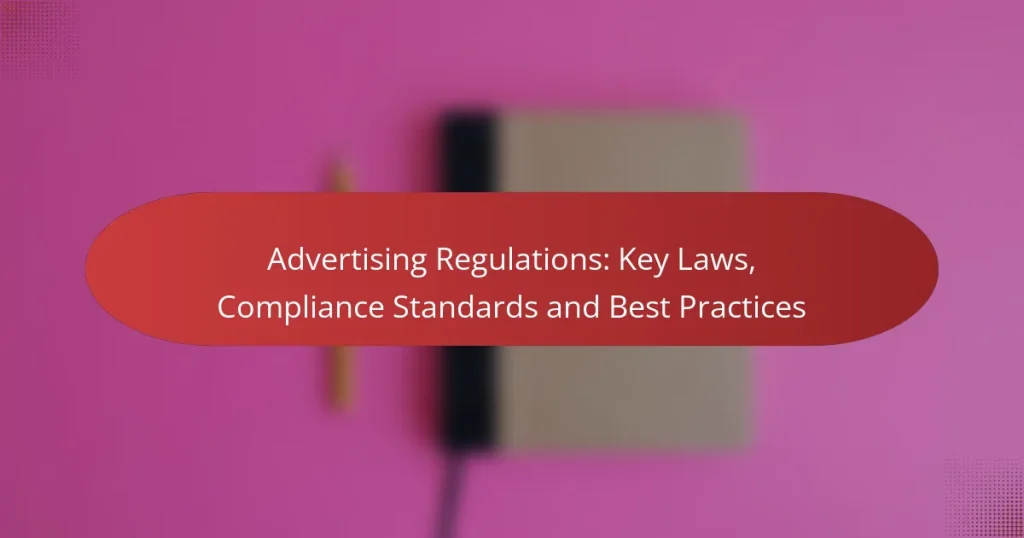Advertising regulations play a crucial role in promoting fair and transparent marketing practices while protecting consumer rights. In South Africa, key laws such as the Consumer Protection Act and the Advertising Standards Authority Code guide compliance efforts, ensuring that businesses adhere to ethical standards. By understanding these regulations and implementing best practices, companies can foster trust and maintain positive relationships with their customers.

What are the key advertising regulations in South Africa?
In South Africa, key advertising regulations ensure that marketing practices are fair, transparent, and protect consumers. These regulations include the Consumer Protection Act, the Advertising Standards Authority Code, the Electronic Communications and Transactions Act, and the Protection of Personal Information Act.
Consumer Protection Act
The Consumer Protection Act (CPA) aims to promote fair, accessible, and sustainable marketplace practices. It provides consumers with rights regarding misleading advertising, unfair marketing tactics, and the right to return goods under certain conditions.
Advertisers must ensure that their claims are truthful and substantiated. For example, if a product is advertised as “100% natural,” it must meet that standard without exceptions. Non-compliance can lead to penalties and damage to brand reputation.
Advertising Standards Authority Code
The Advertising Standards Authority (ASA) Code sets out the ethical standards for advertising in South Africa. It covers various aspects, including honesty, decency, and social responsibility in advertising content.
Advertisers should avoid making exaggerated claims that could mislead consumers. For instance, using terms like “best” or “number one” requires evidence to support such assertions. Adhering to the ASA Code helps maintain credibility and consumer trust.
Electronic Communications and Transactions Act
The Electronic Communications and Transactions Act (ECTA) regulates electronic advertising and communications. It addresses issues such as spam, online privacy, and the security of electronic transactions.
Marketers must obtain consent before sending promotional emails and provide clear opt-out options. Failure to comply with ECTA can result in fines and restrictions on future marketing efforts.
Protection of Personal Information Act
The Protection of Personal Information Act (POPIA) governs how personal data is collected, processed, and stored. It requires advertisers to handle consumer information responsibly and transparently.
Businesses must obtain explicit consent to collect personal data and inform consumers about how their information will be used. Non-compliance with POPIA can lead to significant fines and legal repercussions, emphasizing the importance of data protection in advertising strategies.

How to ensure compliance with advertising laws?
Ensuring compliance with advertising laws involves understanding relevant regulations and implementing systematic practices. Key steps include conducting audits, training staff, and consulting legal experts to navigate the complexities of advertising standards.
Conduct regular audits
Regular audits are essential for maintaining compliance with advertising laws. These audits should assess all marketing materials and campaigns to ensure they align with legal requirements and industry standards.
Consider scheduling audits quarterly or biannually, depending on the volume of your advertising activities. During these audits, check for misleading claims, proper disclosures, and adherence to regulations specific to your region.
Implement training programs
Training programs for employees involved in advertising are crucial for fostering a culture of compliance. These programs should cover the basics of advertising regulations, including truthfulness, fairness, and transparency in messaging.
Offer training sessions at least once a year, supplemented by updates whenever significant legal changes occur. This ensures that your team remains informed about best practices and potential pitfalls in advertising compliance.
Utilize legal counsel
Engaging legal counsel is a proactive step in ensuring compliance with advertising laws. A legal expert can provide guidance on the nuances of advertising regulations and help interpret complex legal language.
Consider retaining a lawyer who specializes in advertising law to review your campaigns before launch. This can prevent costly legal issues and enhance the credibility of your advertising efforts.

What are best practices for ethical advertising?
Best practices for ethical advertising focus on honesty, transparency, and respect for consumer rights. Implementing these principles helps build trust and fosters long-term relationships with customers.
Transparency in messaging
Transparency in messaging means clearly communicating the nature of the product or service being advertised. Advertisers should avoid misleading language and ensure that all claims are easily understandable to the average consumer.
For example, if a product is on sale, the original price and the sale price should be clearly displayed to avoid confusion. This practice not only complies with regulations but also enhances consumer trust.
Respect for consumer privacy
Respecting consumer privacy involves safeguarding personal data and being transparent about how it is used. Advertisers should obtain consent before collecting any personal information and clearly explain how that data will be utilized.
For instance, if a company uses cookies to track user behavior, it should inform users and provide options to opt out. This approach aligns with privacy regulations like the GDPR in Europe and builds consumer confidence.
Truthfulness in claims
Truthfulness in claims requires that all advertising statements be accurate and substantiated. Advertisers must avoid exaggerations and provide evidence for any claims made about their products or services.
For example, if a product claims to be “the best” in its category, it should be backed by credible data or consumer testimonials. Misleading claims can lead to legal repercussions and damage a brand’s reputation.

What are the consequences of non-compliance?
Non-compliance with advertising regulations can lead to significant repercussions for businesses, including financial penalties, damage to reputation, and potential legal action from consumers. Understanding these consequences is crucial for maintaining compliance and protecting your brand.
Fines and penalties
Fines and penalties for non-compliance can vary widely depending on the jurisdiction and the severity of the violation. In the United States, for example, companies can face fines ranging from hundreds to millions of dollars, depending on the nature of the offense and whether it is a repeat violation.
It’s essential to stay informed about the specific regulations that apply to your industry. For instance, the Federal Trade Commission (FTC) enforces advertising laws that can impose hefty fines for misleading advertisements. Regular audits of your advertising practices can help mitigate the risk of incurring such penalties.
Reputational damage
Reputational damage is a significant consequence of non-compliance that can have long-lasting effects on a business. Negative publicity resulting from regulatory violations can erode consumer trust and loyalty, leading to decreased sales and market share.
To protect your brand’s reputation, ensure that all advertising materials are truthful and comply with relevant laws. Engaging in transparent communication and addressing any compliance issues promptly can help rebuild trust with your audience.
Legal action from consumers
Consumers may take legal action against companies that fail to comply with advertising regulations, particularly if they feel misled or harmed by false claims. Class action lawsuits can arise from widespread violations, resulting in costly settlements and legal fees.
To minimize the risk of legal action, businesses should implement thorough compliance training for their marketing teams and establish clear guidelines for advertising practices. Regularly reviewing customer feedback and complaints can also help identify potential issues before they escalate into legal disputes.

What frameworks help in advertising decision-making?
Several frameworks assist in making informed advertising decisions, focusing on compliance with legal standards and ethical considerations. These frameworks guide marketers in creating effective campaigns while adhering to regulations that protect consumers and maintain industry integrity.
Compliance checklists
Compliance checklists are essential tools for ensuring that advertising campaigns meet legal and ethical standards. They typically include key regulations such as truth in advertising, data privacy laws, and specific industry guidelines that vary by region.
When creating a compliance checklist, consider including items such as verifying claims made in advertisements, ensuring proper disclosures for sponsored content, and adhering to local advertising regulations. For example, in the United States, the Federal Trade Commission (FTC) requires clear disclosures for endorsements and testimonials.
To create an effective checklist, start with a basic outline and expand it based on specific campaign needs. Regularly update the checklist to reflect changes in regulations and industry best practices, ensuring ongoing compliance and minimizing legal risks.


